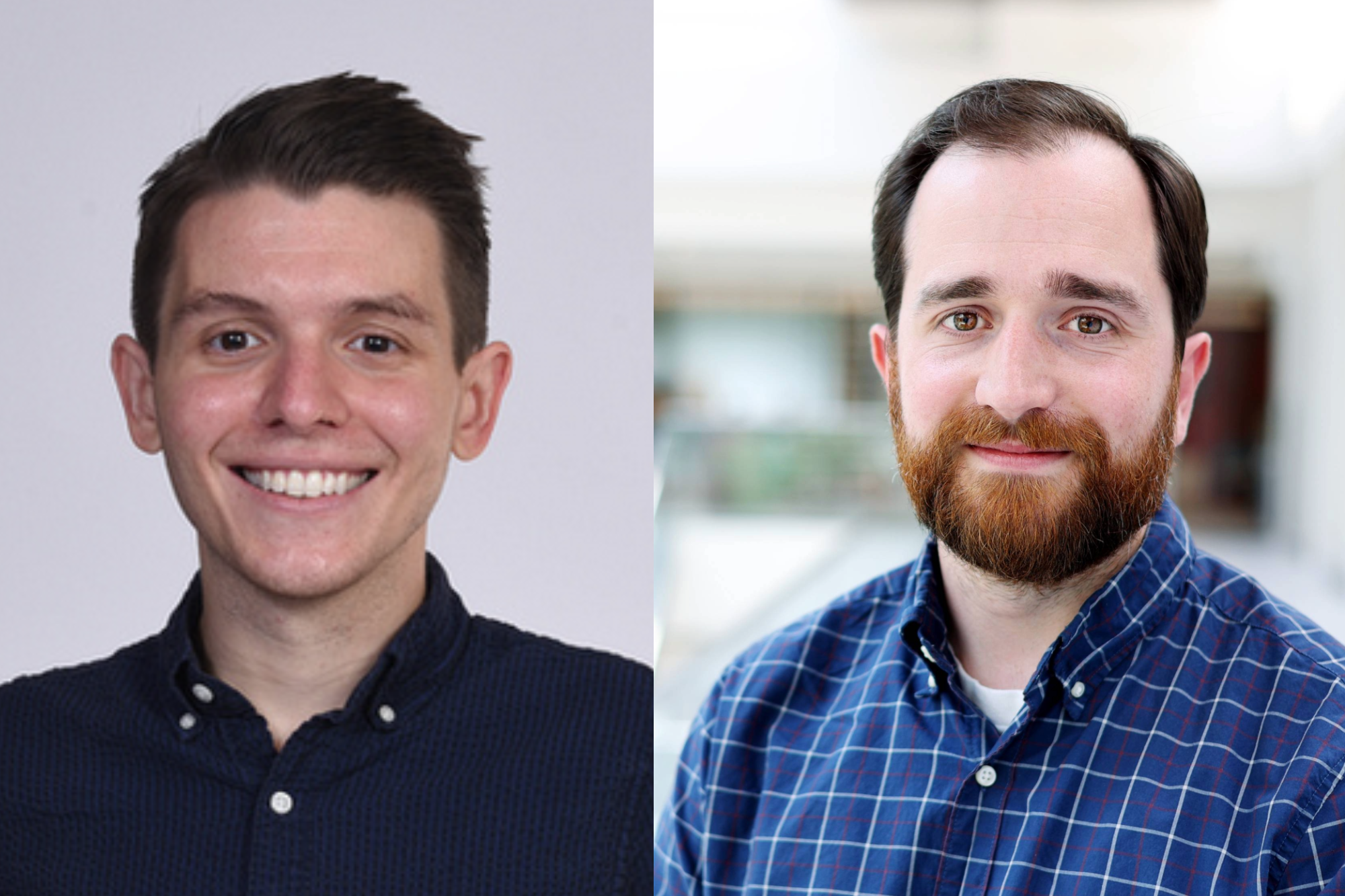
New Math Faculty
July 17, 2025
Above: Chris Miles (left) and Tim Tribone (credit Todd Anderson)
The Department of Mathematics is hiring a bumper crop of new faculty members for the 2025-26 academic year. Two of them are profiled here: Chris Miles and Tim Tribone.

Finding the right Level
Tim Tribone
Everyone learns in different ways. Some are great at memorization, others visualization. Where one person learns well in a group another will thrive on their own. This can lead to roadblocks in subjects like math, as it can be tricky to approach students at a level they understand and in a way they mesh with. If overcome it reveals a massive strength of the field: teaching problem-solving and pattern-recognition skills that are useful anywhere. But the process of getting there, of finding that level students are at, can be a complicated challenge.
Enter Tim Tribone, who among other things has led undergraduate research focused on the mathematics behind card games, taught classes at every level and worked with students exploring virtual reality as a pre-calculus teaching tool.
Tribone has a knack for finding new approaches to meet a student’s needs and interests, a skill that developed from r his own educational journey. Originally a music major, he eventually shifted towards math following the guidance of a mentor. He would continue working his way to a Ph.D. from Syracuse University before taking a postdoctoral researcher position here at the U.
Along the way, Tribone has learned the importance of helping students at the level they currently are. For his undergraduate researchers he’s learned from his music major experience to create an environment that shows them what a career in math is like. But for his students in business math it’s far more important to treat math like a toolbox, focusing more on direct use and applications so a student can recognize, for example, why an Excel equation isn’t working.
This sort of teaching is Tim Tribone’s focus moving forward as he takes a faculty position at the U. He enjoys working with postdocs, faculty and undergraduates in research, but he’ll be devoting the lion’s share of his time to teaching. Any student can learn and excel in mathematics, you just need to find the right level for them to do so.
Blazing a New Trail
Chris Miles

As technology evolves and industries grow, education must adapt to prepare the next generation for these upcoming opportunities.This requires bringing in new instructors to teach new classes, a rare and exciting opportunity to design entirely new curriculums. The new bioinformatics major is one such initiative, a trailblazing endeavor that new math faculty Chris Miles will soon be joining.
Or perhaps “rejoining” would be the better word to use here as Miles is one of our own alumni. A first-generation student originally from Pennsylvania, he’s returning to the U after teaching at both New York University and UC Irvine. Called back in part by the aforementioned new major, he explains that “It’s an exciting chance to build something new here; it’s a perfect project- based subject to design classes around.”
When asked to describe his vision for these new classes, he says that “In this field, you often have biological data from an experiment and have to figure out what to do with it. I want to expose students to that process, present data and encourage them to figure out how to use it. There’s no right answer!” That’s the beauty of a new degree, there’s no tradition that must be adhered to, so you truly get to design whatever works best.
On top of helping to pioneer the bioinformatics curriculum, Miles will also continue his research in “mathematical biology,” which includes the applications of mathematical modeling and AI with biological data. Machine learning allows researchers to survey all data in a set simultaneously and find patterns or equations: in the study of cells, these equations work to help us understand why cells work so well despite being built by seemingly random and disorderly molecular building blocks. Miles describes a field of two extremes where “some researchers will write equations for what they think is true of biology while others let AI decide.” He continues with,“I think it's fun to walk between the two extremes and take the best aspects of both.”
On a new path using new tools, adaptation is mandatory to succeed, but that’s an expertise Chris Miles brings to the table. He looks forward to teaching aspiring students in the upcoming semesters, pushing forward on this exciting new frontier of interdisciplinary discovery.
by Michael Jacobsen